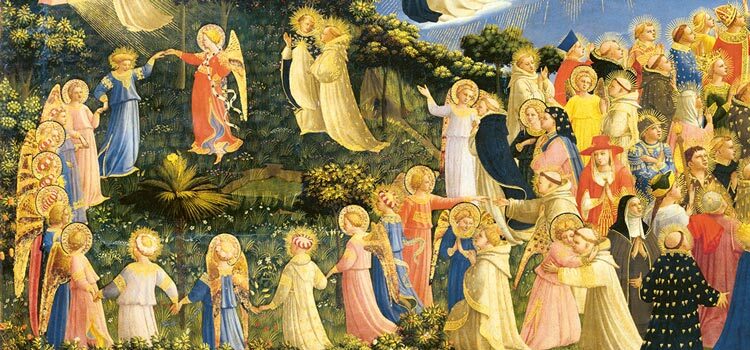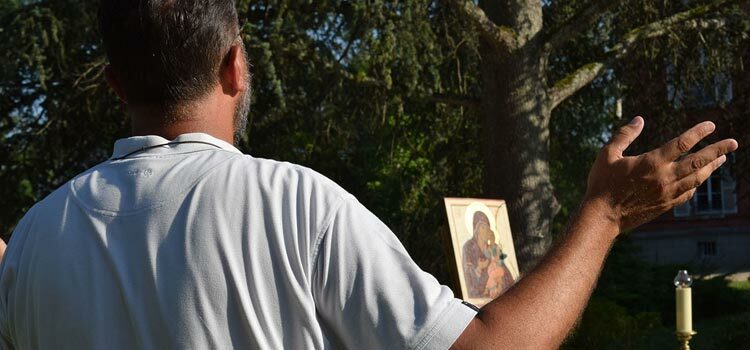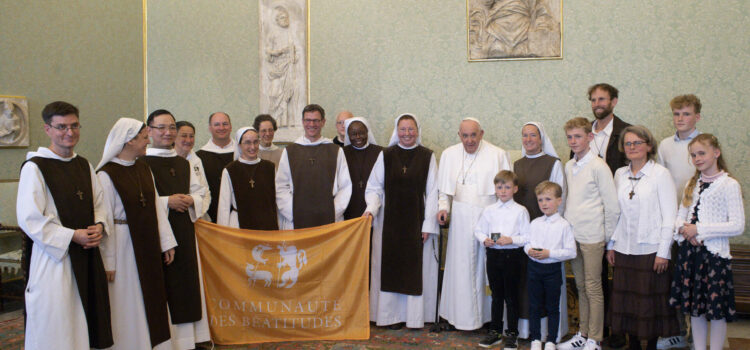As a reminder, lectio divina is a slow, meditative and prayerful reading of the Word of God that it may impregnate and transform us. The aim of lectio divina is to lead us from a written text to meeting the living God. Sometimes, while reading the biblical Scriptures for the first time, we are captivated by a word which leads us immediately into prayer, or into silent adoration in the Lord’s presence. Let’s welcome this grace and thank the Lord for it. But, when we decide to be faithful to Lectio divina, day after day, we can see that it’s not always like that… and we understand the need to follow a path that has been beaconed by many believers through the centuries.
We shall follow the path Guigues le Chartreux describes in « Letter on contemplative life ». Although this letter is old, it remains the most important reference on this subject. Guigues sees a « ladder » with four rungs which raises the monks from the earth to heaven. Those are: reading, meditation, prayer and contemplation.
Let’s choose a reading of about ten verses
for our lectio, as we remain in a receptive and attentive mode. We start by praying and asking the Holy Spirit, who inspired the Scriptures, for help and the Virgin Mary to mold in us a « listening heart .»
Reading
We read the text slowly several times over, listening intently. Reading aloud, pronouncing the words, is a precious help in that regard ; it gathers three of our senses to receive this Word : In fact we see the text, pronounce it with our mouth, listen to it with our ears.
This way of pronouncing what we read (it can be just a whisper) helps, without doubt, the Word to sink into our heart: « The Word is very near you, it is in your mouth, it is in your heart… » (Deut 30:14) It will also help us to get rid of the thoughts which invade our heart, and have more strength when we read only « with our eyes ».
Going over a text« several times », although the text may be familiar, requires an act of faith. We have to believe that the Word is always new and, since we heard it last, it has something new to tell us.
Meditation
This word is very rich and has several meanings.
We find in psalm 1 : « Blessed is the man… his delight is in the law of the Lord, and on his law he meditates day and night » Here, meditating means whispering, repeating, chewing the Word so it may saturate us deeply, so it can transform our memory and our heart. To begin with we stop at one or two verses which attract us in a particular way and start « drawing them down into our heart » repeating some short passages that do not strain our memory but call up all our attention and our capacity to listen.
We start first by pronouncing the Word aloud and then inwardly. We are sometimes urged to remain a long time in silence with this Word and we feel our heart « burning », as the Lord’s grace works through those words.
While meditating, we can also link those verses with others in the Bible. A word, a picture, sends us to another verse, in another book in the Bible, written in a different style at different times. We can see, little by little, the unifying factor of what God wants to tell us running through the Bible, in so many different ways. This makes our reading richer and …the practice is tasty!
We are going to ask ourselves:. What is the Lord saying about Himself? In fact, all the Scriptures have been given to us to reveal our Father’s loving care for us, and it is well to ask ourselves that very question. We follow that question with another one: « what does the Lord want to tell me today ? » We do believe the Lord wants to converse with each one of us in a unique way.
We can also look for the various meanings of the text: literal meaning (this word has been given in such and such a time in the history of salvation), the Christological meaning (in which we search how Jesus fulfills the Word given to Israel), the moral sense (what we have to do) and the eschatological meaning (what already exists in the eternal glory).
Prayer
After this intense reading and a deeper understanding through meditation of the Word received, we are led to prayer: praising the Lord for all He has revealed to us about Himself, asking in prayer for a conversion or interceding, and so on …
The Word we have received and meditated on, becomes the support of what we are going to say in prayer. Day after day, our prayer becomes richer with all we have meditated on. The Lord Himself gives us the words to speak to Him, from the « Our Father » and the psalms, of course, but also from other biblical scenes.
Contemplation
Sometimes, we shall be seized by God’s presence in prayer (or one of the former steps). We have to receive this like a grace and let go of the rest: « Then, prayer can be engulfed by silence, not the kind of silence coming from the other’s absence, or from myself, but the silence that comes, beyond the Word when it reaches us ». (« La force du silence » (The strength of silence…) Cardinal Sarah), Then we can go down on another rung, and thus come and go on this « ladder ».
The rungs will not always follow systematically in the sequence shown here ; we have to listen to what the Holy Spirit wants to tell us, and we have to stop where He urges us to do so.
Conclusion
Last of all, let’s thank the Lord for the grace of this moment we spent listening to Him : The Word works in us even if we don’t notice it immediately. We can write down a word which touched us, and, as we finish Lectio, we can keep in our heart a short verse we have learnt by heart, we can go back to it and live with it throughout the day.
The Quotation
«Everything we may draw from the words of Holy Scriptures, has no other aim but charity.»» Saint Augustine
Which texts can be taken for Daily Lectio?
|
TO GO FURTHER…Only for today
Books
|
Find the previous articles in our “Life of prayer” series.
(publication edited by brothers and sisters of the Community of the Beatitudes – © rights reserved).






